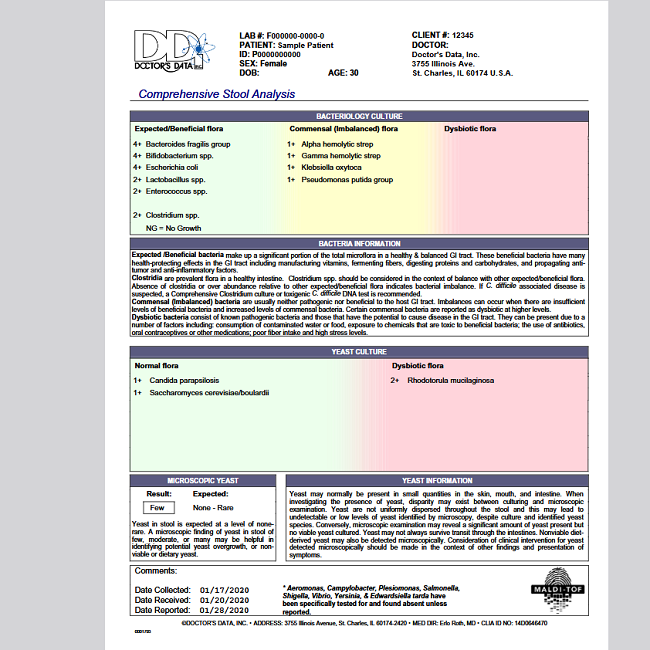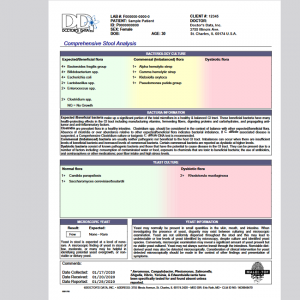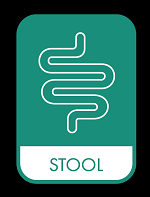Home / Shop
Doctors Data Comprehensive Stool Analysis








- Description
- Specifications
The Doctor’s Data Comprehensive Stool Analysis (CSA) is an invaluable non-invasive test which helps pinpoint the causes of gastrointestinal symptoms and chronic systemic conditions. This test measures key markers of digestion, absorption and inflammation. It contains comprehensive bacteriology and yeast cultures to identify the presence of beneficial flora, imbalanced flora including Clostridium species, and dysbiotic flora, as well as the detection of infectious pathogens
Test Features
- Doctor’s order not required
- No lab visit or office visit required
- Free Shipping within US
- Convenient at-home specimen collection procedure
- Results emailed to you
- Quick Results
- Result specific commentary provided
Useful for:
- Gastrointestinal Symptoms
- Autoimmune Disease
- Joint Pain
- IBD/IBS
- Inflammation
- Food Sensitivities
- Nutritional Deficiencies
- Skin Conditions (Atopic Dermatitis)
NOTE: Your Doctors Data Comprehensive Stool Analysis test report will be sent to the email used when ordering, unless otherwise specified. If you have further questions after receiving your report, a Telehealth Consult with Dr. Ray Psonak is available.
View Sample Report
FAQ's about At Home Health Tests
Analytes Tested
Acetate, Additional pathogens culture, Bacteriology culture, aerobic, Butyrate, Calprotectin, Carbohydrates, Elastase, Fat Stain, GI Pathogens 6-11 targets PCR, Lactoferrin, Lysozyme, Occult Blood, pH, Propionate, sIgA, Valerate, Yeast culture,
Detailed Information
The Comprehensive Stool Analysis (CSA) is an invaluable non-invasive diagnostic assessment that permits practitioners to objectively evaluate the status of beneficial and imbalanced commensal bacteria, pathogenic bacteria, yeast/fungus by culture, PCR, and other gold standard methods. Precise identification of pathogenic species and susceptibility testing greatly facilitates selection of the most appropriate pharmaceutical or natural treatment agents.
Important information regarding the efficiency of digestion and absorption can be gleaned from the measurement of the fecal levels of elastase (pancreatic exocrine sufficiency), fat, muscle and vegetable fibers, and carbohydrates.
Inflammation can significantly increase intestinal permeability and compromise assimilation of nutrients. The extent of inflammation, whether caused by pathogens or inflammatory bowel disease (IBD), can be assessed and monitored by examination of the levels of biomarkers such as calprotectin, , lactoferrin, and lysozyme via this stool test. These markers can be used to differentiate between inflammation associated with potentially life-threatening inflammatory bowel disease (IBD), which requires lifelong treatment, and less severe inflammation that can be associated with irritable bowel syndrome (IBS) which is frequently due to the presence of enteroinvasive pathogens. Calprotectin and lactoferrin are only markedly elevated prior to and during the active phases of IBD, but not with IBS. Monitoring these levels in patients with IBD can therefore facilitate timely treatment of IBD, and can be ordered separately. Since the vast majority of secretory IgA (sIgA) is normally present in the GI tract, where it prevents binding of pathogens and antigens to the mucosal membrane, it is essential to know the status of sIgA in the gut. sIgA is the only bona fide marker of humoral immune status in the GI tract.
Cornerstones of good health include proper digestion of food, assimilation of nutrients, exclusion of pathogens and timely elimination of waste. To obtain benefits from food that is consumed, nutrients must be appropriately digested and then efficiently absorbed into portal circulation. Microbes, larger-sized particles of fiber, and undigested foodstuffs should remain within the intestinal lumen. Poor digestion and malabsorption of vital nutrients can contribute to degenerative diseases, compromised immune status and nutritional deficiencies. Impairment of the highly specific nutrient uptake processes, or compromised GI barrier function, as in "leaky gut syndrome," can result from a number of causes including:
- Low gastric acid production
- Chronic maldigestion
- Food allergen impact on bowel absorptive surfaces
- Bacterial overgrowth or imbalances (dysbiosis)
- Pathogenic bacteria, yeast or parasites and relate dtoxic irritants
- The use of NSAIDs and antibiotics
Impairment of intestinal functions can contribute to the development of food allergies, systemic illnesses, autoimmune disease, and toxic overload from substances that are usually kept in the confines of the bowel for elimination. After performing a stool test, efficient remediation of GI dysfunctions incorporates a comprehensive guided approach that should include consideration of elimination of pathogens and exposure to irritants, supplementation of hydrochloric acid, pancreatic enzymes and pre- and probiotics, and repair of the mucosal barrier.
The Comprehensive Stool Analysis does not include analysis for parasites. For a stool test that includes assessment of the presence for parasites, consider this test with the add-on Comprehensive Stool Analysis + Parasitology. Alternatively, you may order just a Parasitology 3-Day test.

One thought on “Doctors Data Comprehensive Stool Analysis”
Comments are closed.